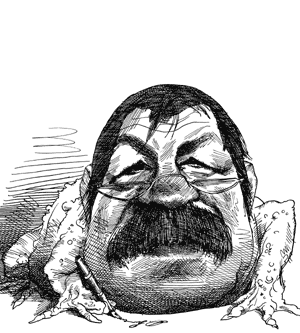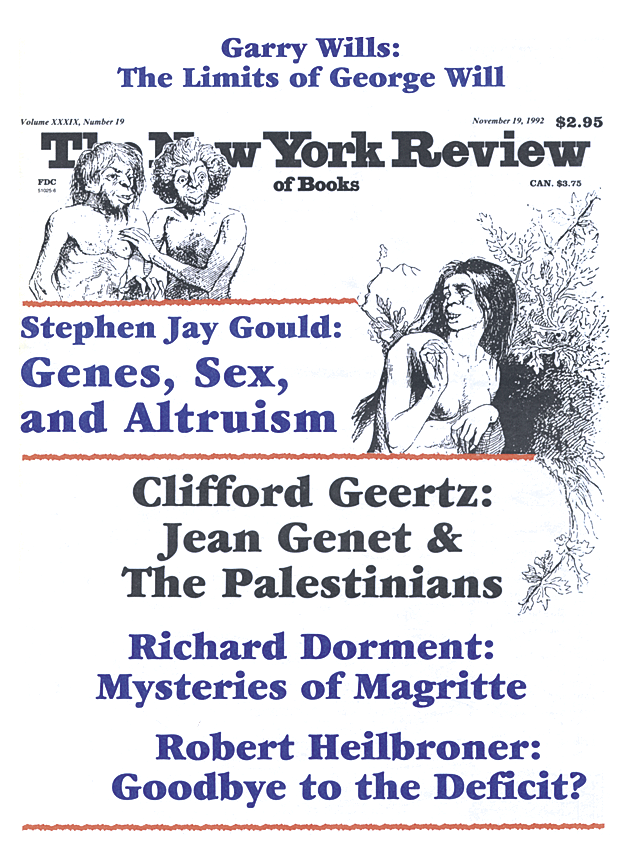Günter Grass is the grand old man of German literature and its liberal conscience on matters like disarmament, abortion, the third world, and German reunification, which he vehemently opposed on the grounds that two small Germanys were more beautiful and less threatening than one large one. The fiction he published in the Eighties was not, on the whole, well received. This depressing fact was mentioned by many German reviewers of his latest novel, and must have been on his own mind when he wrote it. The Call of the Toad has a wan, valedictory ring. The title is a literal translation of the German Unkenrufe, but Germans use the word metaphorically as well, to mean prophecy of doom.
Like many of Grass’s other stories, The Call of the Toad is set in Gdansk, the ancient Hanseatic city that is now Polish, but was German Danzig when he was born there in 1927. The story opens in 1989 on All Souls’ Day, the day of the dead, when people carry flowers to the cemeteries. Like Grass, the hero, Alexander Reschke, is an exile from Gdansk living in West Germany. A widower in his sixties, he is a professor of art history at the university of Bochum. It is no accident that his special field is funereal: he is an expert on Baroque gravestones and memorials. The visit to his native city is partly for professional but mostly for sentimental reasons. Danzig was destroyed in the war and since rebuilt. The novel is full of guidebook passages on its churches, graveyards, parks, and mansions: they are colored by the professor’s nostalgia for the past and dismay at the present, and provide opportunities for reflections on destruction and the legitimacy (or not) of restoration.
The Polish widow Alexandra is a restorer and gilder by profession. A cheerful lady, she has come to terms with the fact that all restoration is a fraud. She is not quite sixty when Alexander meets her in the market. Grass goes on calling them “the widower and the widow”: death is never to be forgotten. They are both buying asters when they meet. Hers are to put on her parents’ grave. Her parents lived in Vilno, and were expelled when the city became Russian. (In 1989 it had not yet become Lithuanian.) Alexander accompanies Alexandra to the cemetery. They agree that it is sad for people to be buried in alien soil, a common fate in what Alexander calls “the century of expulsions.” He is inclined to brood out loud about Jews, Palestinians, Kurds, Sudeten Germans, and all the rest. There and then, Alexander and Alexandra decide to found a Polish-German-Lithuanian Cemetery Society (the Lithuanian part has, in the event, to be postponed). Its object will be to allow Germans expelled from Germany’s former eastern provinces and Poles resettled in what was once Germany to be buried where they were born. It will also cement German-Polish reconciliation. Alexander and Alexandra go back to her flat to work out the practical details of their idea over supper and a bottle of Bulgarian wine. Then, on her initiative, they go to bed together.
It proves a success in an undemanding, tolerant, gemütlich way. He puts up with her Polishness, she with his Germanness, he with her loud laughter and ferocious scent, she with his tendency to lecture and nitpick. The cemetery idea is also a success. Elderly German Danzigers in West Germany are keen to buy burial plots in Gdansk, and the Poles are keen to sell the land for deutsche marks. A board is set up with Polish and German members, all terribly careful about one another’s susceptibilities. There is a banker, a civil servant, a bossy lady from Lübeck, a Catholic priest in jeans, a Lutheran pastor, and a piece of heritage in the person of Erna Brakup, one of the handful of Germans who remained when Danzig became Polish. She is the octogenarian widow of a docker and lives in a primitive cottage uttering primitive wisdom in the Danzig patois of the prewar period—a dying language which will disappear when the last of her generation is buried. All these characters are pretty schematic, with just one or two national characteristics or professional deformations apiece. Their administrative and financial activities, on the other hand, are described in bureaucratic detail. In spite of the intended irony, the process sometimes seems almost as tedious as the minutes of real board meetings.
The cemetery enterprise takes on an unstoppable capitalist momentum, and soon there are new proposals: exhume and rebury dead Danzigers already lying in West German graveyards; build “twilight homes” so that elderly exiles can return to await death on their native soil. Until it arrives, they will, of course, have to be visited by their families from West Germany; so plans are made for extra hotels and for tasteful, environmentally acceptable lakeside bungalows with a golf course attached.
Advertisement
Erna Brakup is disgusted by all this and stalks out of a board meeting. Soon afterward, she dies. Highminded Alexander and right-feeling Alexandra are disgusted too. They resign, and send a tape with the reasons for their resignation to the board. The tape is backed by toad calls recorded during their picnics in the countryside. Eventually they get married and drive to Italy for their honeymoon. But since their destiny in the novel is to die, their car goes off the road and over a precipice between Naples and Rome.
Alexandra is a natural pragmatist. As a young girl she enthusiastically embraced communism because she believed in justice and equality and thought that under communism they would come about. She became disillusioned, first with communism, and soon with capitalism as well. Alexander is an old-fashioned liberal idealist whose students affectionately mock him as a “veteran of ’68.” By 1989 there is nowhere for the two of them to build their utopia except in a graveyard. There is no place for people like them in the post-Communist, post–German-reunification, post–Gulfwar world.
There is really only one ray of hope in Danzig, Poland, Europe, the world, possibly even the universe, and it is cast by Mr. Chatterjee’s bicycle rickshaw business. Alexander’s friend Mr. Chatterjee arrived in Danzig during the Eighties when there was no gasoline for taxis, and drove tourists from the airport to their hotels in a shiny new bicycle rickshaw of Dutch manufacture. He imported two more bicycle rickshaws, but the Poles, true to their national character, were too proud to drive them. So Mr. Chatterjee imported a few cousins from Bengal. The business prospered. Young unemployed Poles saw the point and swallowed their pride. Bicycle rickshaws began to be made locally and provided work for laid-off workers in the derelict shipyards. Bicycle rickshaws neither pollute the atmosphere nor create traffic jams. Cities like Madrid and Rome enthusiastically banned automobiles and ordered quantities of bicycle rickshaws. Mr. Chatterjee’s cousins flourished all over Europe:
The Polish-Bengali symbiosis…announces the predestined Asian future of Europe, free from nationalistic narrowness, no longer hemmed in by language boundaries, polyphonically religious, superrich in gods, and above all blessedly slowed down, softened by the new warm and wet climate.
This is an excerpt from Alexander’s recorded resignation speech (backed by toad calls) and a caricature of the kind of thing Grass has been saying in public utterances all his life. Everything he has advocated seems farther off in the Nineties than it ever has before.
The Call of the Toad is a novel of political disillusionment, and in that it resembles another post-Communist novel, by the English writer Julian Barnes. The Porcupine is set in Bulgaria today. The ex-president, an old Stalinist monster, is being tried—with painstaking democratic fairness, or so it seems—for some of the lesser crimes he committed when in power. But as the trial proceeds, it emerges that it is a show trial, just like the ones under the old regime. The new regime is hardly less corrupt and hypocritical than the old, even if it is less brutal. No one wants to return to the old, but it has one advantage over capitalism: at least it had in principle some concern for the poor.
Events like the ones in The Porcupine could happen. Some already have, and others may be about to. The Call of the Toad, on the other hand, is fantasy—though only just. No German-Polish cemetery association or international rickshaw business is likely to come about—and Grass’s unspoken comment seems to be: more’s the pity. This novel is ideological, heavily symbolic, and downbeat—not exactly a winning combination. The whole book is a wry joke: and a sly one which creeps up on you from behind. Unfortunately, you can sometimes hear the floorboards creaking. Grass has lost his ebullience; he has to rely on the ironic distinction and charm of his style, and on the accurate mimicry of the spoken and written styles of his characters. All these things are diminished in translation, even when the translator is as skillful as Ralph Manheim, who died a few weeks ago. He has done particularly well by Alexandra, and this is important, because the character relies on her charm (for the reader as much as for her lover), and her charm relies almost entirely on her engaging Polish syntax. Still, the best things in the book are Grass’s own etchings of toads with sad, satirical eyes. He is unique as a draftsman of animals; his creatures manage to combine zoological accuracy with anthropomorphic irony. Unfortunately the toads in the English edition are a bit diminished too, smaller and blurrier because of the smaller format.
Advertisement
This Issue
November 19, 1992



